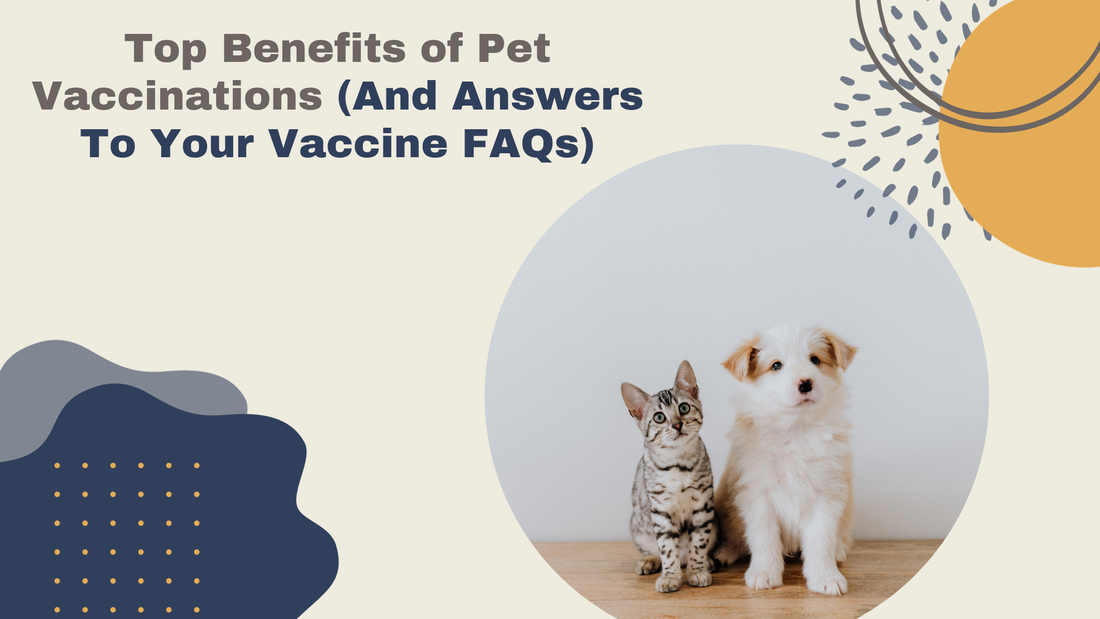|
Keeping your pets’ vaccines up-to-date comes with life-saving benefits and minimal risks. That’s why they’re an important part of routine preventative care for all dogs and cats. Still, it’s common for pet parents to have questions about how pet vaccination works, the benefits provided, and how to make sure you’re doing what’s best for your pet. This blog breaks down the science behind pet vaccinations and answers some frequently asked questions about their safety and importance.
What Are Pet Vaccines? Vaccines help teach your pet’s immune system how to recognize and fight off certain disease-causing agents. They introduce a controlled preparation of either killed or altered virus particles into your pet’s system. This triggers an immune response, prepping the animal’s immune system to react to future infection from that microorganism. Pets are typically vaccinated subcutaneously (just under the skin) or intramuscularly (into the muscle) for maximum immune system stimulation. With distraction and low-stress handling techniques, most don’t even notice the injection. Benefits Of Pet Vaccination Vaccination is an important part of your pet’s healthcare and their first line of defense! While no medication is completely free of risk, the benefits of pet vaccination far outweigh the risks. Benefits of pet vaccination include: Prevent potentially deadly illnesses Disease prevention is the top benefit of keeping your pet’s vaccines up-to-date. Core vaccines protect against highly contagious and potentially deadly diseases such as parvovirus, canine distemper, rabies, and feline viral rhinotracheitis and panleukopenia. These serious and often painful conditions can be prevented with appropriately scheduled and administered vaccinations. Protect your family Some diseases that affect our pets can also be dangerous for people. By keeping pets vaccinated, you’re protecting your family from potentially deadly diseases. Consider the fact that approximately 59,000 people around the world die each year from rabies, according to the World Health Organization. But only one or two deaths occur in the US, where laws require pets to be vaccinated. Prevent the spread of contagious diseases With the current outbreak of atypical canine infectious respiratory disease here in Oregon, pet owners are already taking precautions to protect their pups. And while not much is known yet about what causes this particular disease, we do know that vaccination can help! The OVMA has noted that most dogs, especially those vaccinated against respiratory illness, experience mild illnesses. Not only does vaccinating protect your pup, but it also helps prevent the spread to other animals. That’s why boarding facilities, doggy daycares, and even some dog parks require pets to be vaccinated before they visit. An ounce of prevention is worth a pound of cure Vaccines are useful in preventing serious, life-threatening illnesses. When unvaccinated pets contract these illnesses, they often require intensive treatment, and the outcomes are rarely positive. Long hospitalizations, round-the-clock care, and medical interventions aren’t just expensive, they’re also stressful for you and your pets. That’s why an ounce of prevention is worth a pound of cure! After a pet has been fully vaccinated, their immune system rarely fails to fight off the disease. Pet Vaccine FAQs Are Pet Vaccines Safe? According to the American Animal Hospital Association, vaccination is the most reliable method of disease prevention and poses few risks. Serious side effects rarely occur. Improvements are constantly being made to increase vaccine safety and effectiveness. Most importantly, vaccines are much safer than contracting the diseases they prevent. While few pets will react adversely to a rabies vaccine, 100% of rabies cases are fatal. What Should I Expect After My Pet’s Vaccination? After receiving a vaccination, your dog or cat may show some mild side effects, such as:
These are all normal effects and are not a cause for concern. You can keep your pet comfortable after vaccination by making sure they have a quiet, cozy place to rest and recuperate. Contact your veterinarian if these symptoms last over 24 hours or seem severe. Which Vaccines Does My Pet Need? Pet vaccines can be broken down into two categories: core and lifestyle. We recommend that every pet gets their core vaccines. For dogs:
For cats:
Non-core or lifestyle vaccines may only be necessary in some situations. For example, if your dog often goes hiking with you in tick country, we might recommend the canine Lyme vaccine. Your veterinarian can work with you to establish the appropriate administration and booster schedule based on your pet’s age, health history, and lifestyle. Do I Need To Vaccinate My Indoor-Only Cat? We recommend all pets, including indoor cats, get their core vaccines. This helps to protect them from serious diseases if they ever bolt out the front door, visit a grooming or boarding facility, or even spend time nose-to-nose with a neighbor cat through the screen door. Even a quick sniff around your backyard could be enough for your unvaccinated kitty to contract one of the very contagious viruses cats are susceptible to. Is Your Pet Up-To-Date On Their Vaccines? Routine vaccination is an important part of keeping pets happy and healthy. Vaccination is an inexpensive, low-risk, high-reward part of your pet’s overall health plan. Call us to schedule your pet’s next annual exam and ensure they’re current on necessary vaccines. Still have questions? Our veterinary team is passionate about making sure owners have the knowledge they need to make informed decisions about their pets’ care. Comments are closed.
|
Contact Us
Mountainside Veterinary Hospital
www.mountainsidevets.com [email protected] Office: (971) 405 - 1111 Fax: (503) 498 - 5322 |
Hospital Location
15000 SW Barrows Rd. Ste. 101, Beaverton, OR 97007
|
Office Hours
Monday - Friday: 8:00a - 6:00p
Saturday: 8:00a - 4:00p Give us a call today to schedule your appointment! (971) 405-1111 |
Site powered by Weebly. Managed by IDEXX Laboratories


 RSS Feed
RSS Feed
